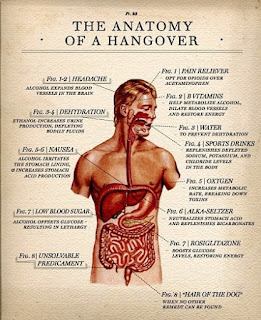Saturday, January 2, 2016
Anatomy of a Hangover
Veisalgia or what the hell happened last night?!?
Anyone who drinks alcohol has woken up the morning after a big night out feeling like death. A hangover, which is medically known as veisalgia, is your body’s way of telling you that you’ve had too much to drink.
There is an array of physical symptoms associated with hangovers, such as headache, fatigue, nausea, dehydration, increased sensitivity to light and sound, drowsiness, body aches, vertigo, and for some people, cognitive and mood disturbances, such as depression, anxiety, and irritability.
Additional symptoms are gastrointestinal problems (such as stomach pain and vomiting), sleep disturbances, and sympathetic hyperactivity, such as sweating, tremor, and increased blood pressure.
A direct effect of alcohol is dehydration. Alcohol is a diuretic, which means that it naturally dehydrates the body because it causes the body to increase urinary output. Additionally, vomiting that occurs after excessive drinking further dehydrates the body and also leads to electrolyte imbalance. This combination of dehydration and electrolyte imbalance produces the hangover symptoms of thirst, headache, and dizziness. So, try to drink a glass of water between alcoholic drinks to decrease alcohol intake and dehydration.
The symptoms of fatigue, mood disturbances, and weakness can be attributed to alcohol’s direct effect of lowering blood sugar levels. Alcohol metabolism causes the body to build up chemicals that hamper glucose production, which would decrease the glucose in our bloodstreams. Additionally, alcohol breaks down glycogen, which is the body’s stored energy, in the liver to glucose, which is then expelled in urine.
So, if you already have a hangover try to consume foods and drinks that contain fructose (such as fruit juice or honey) because fructose will help your body burn the alcohol faster...also is a good time to rest ;)
Another direct effect of alcohol is gastrointestinal disturbances, such as irritation of the stomach and intestines, inflammation of the stomach lining, and delayed stomach emptying. Furthermore, excessive consumption of alcohol can lead to an accumulation of fat compounds in liver cells, resulting in what is known as “fatty liver”. Alcohol also promotes excess gastric acid production. All of these factors can lead to the stomach pain and general queasy feeling experienced during a hangover....so, moderation is the key.
Time knows 6 ways to ease your hangover:http://time.com/3648823/cure-fix-hangover/
Know more about veisalgia:http://www.medscape.com/viewarticle/522979
http://alcoholrehab.com/alcoholism/what-is-a-hangover-veisalgia/
Corina Marinescu
Subscribe to:
Post Comments (Atom)

No comments:
Post a Comment